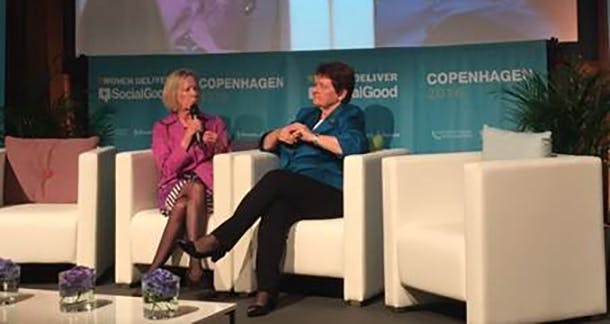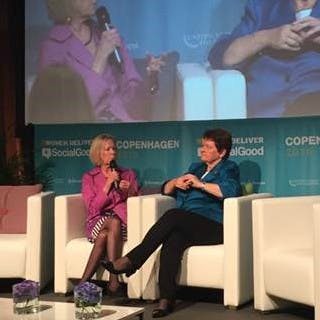
What happens when you bring together leading advocates from around the world for a discussion on gender equality? A powerful conversation on what we need to do to empower girls and women everywhere.
On Monday May 16, the United Nations Foundation and partners including Johnson & Johnson hosted “Women Deliver +SocialGood,” an event connected to the Women Deliver conference, to talk about solutions to secure the rights and well-being of girls and women.
People from more than 60 countries have joined the conversation at the conference center and online. From policymakers to issue experts to business leaders, participants came from across sectors and across the world, but shared a core message: Empowering girls and women is the right thing to do AND the smart thing to do to build a better world.
Here are eight key themes we heard from the day’s conversation, and view our Storify to get more highlights from the event.
We are in a unique moment, which we must seize to change the landscape for girls and women.
As UN Foundation President and CEO Kathy Calvin noted, the launch of the Sustainable Development Goals give us a unique opportunity to make progress for girls and women. Throughout the event, participants spoke of the need to not just move the needle, but change the landscape for girls and women. We shouldn’t wait any longer for equality. Now is the time to move with urgency.
Young people need to be at the table when it comes to decisions that impact their lives.
Several youth leaders joined the event, and their message was clear: You can’t talk about youth without youth. They need to be heard and be at the decision-making table. As U.S. Ambassador-at Large for Global Women’s Issues Cathy Russell said: “[Adolescent girls] aren’t asking us to speak for them; they’re asking us to listen to them.”
To reach the Sustainable Development Goals, we need to reach gender equality.
Progress for girls and women means progress for all. Multiple speakers noted the positive ripple effects of investing in girls and women; in turn, they invest in the health, education, and empowerment of their children, helping break the cycle of poverty. David Nabarro, UN Special Advisor on the 2030 Agenda for Sustainable Development, summed it up perfectly, saying: “We have a plan for the future…and right at the center is girls and women.”
There can be no gender equality without data equality.
Several panels noted the importance of gender data to make sure we understand the lives of girls and women; that we creating programs proven to improve lives; and that we monitor progress and hold our leaders accountable. Specifically, we need to do better at gathering and using data on girls and women. The good news, as noted by Sarah Hendriks from the Gates Foundation, Ruth Levine from the Hewlett Foundation, and Emily Courey Pryor from Data2X, is that there is a growing spotlight on gender data, and now is the time for a gender data revolution.
It’s about choice.
Fundamentally, empowerment means that girls and women have the power to make their own decisions about their lives – from when and who to marry, to when and whether to have children, to what kind of career to pursue. When girls and women have choice over their bodies and their lives, they can thrive and so can their families and communities. Modern contraception, education, and access to mobile technologies and financial savings are a few of the important solutions that were highlighted to empower women.
No one should be left behind.
Our work for empowering girls and women will only be done when we reach the most vulnerable and marginalized girls and women – “the people at the last end of the last mile,” as the ONE campaign’s Eloise Todd said. World leaders pledged to “leave no one behind” when they adopted the Sustainable Development Goals, so we need to put a special focus on reaching girls and women left out of global progress. We especially need to meet the needs of girls and women in emergency settings – who are bearing the brunt of the consequences of conflict, contagion, and climate change – with health care and other basic necessities.
Empowering girls and women belongs to boys and men, too.
To achieve equality, we have to engage boys and men. This includes fostering respect and the view of girls and women as capable and powerful. It also includes reaching out to boys and men to become more involved in their families. Gary Barker, the Founder of Promundo, noted that when men in their programs attended family health visits, they became more invested in their families’ health and violence against women declined. When we change attitudes, we change lives.
Where are the girls?
Anne-Birgitte Albrectsen, the head of Plan International, tasked us all with always asking the question, “Where are the girls?” We have to make sure adolescent girls, who are often the most vulnerable population, are included in programs, policies, and decisions. Archana Somasegar, a Teen Advisor of the UN Foundation’s Girl Up campaign noted that “Girls are the changemakers,” driving positive change in their communities when their rights are realized.
Today’s event was just the start of the conversation at Women Deliver. Join the conversation throughout the week at WDLive.org and with the hashtag #WD2016.

